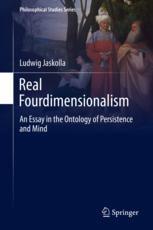

Most ebook files are in PDF format, so you can easily read them using various software such as Foxit Reader or directly on the Google Chrome browser.
Some ebook files are released by publishers in other formats such as .awz, .mobi, .epub, .fb2, etc. You may need to install specific software to read these formats on mobile/PC, such as Calibre.
Please read the tutorial at this link: https://ebookbell.com/faq
We offer FREE conversion to the popular formats you request; however, this may take some time. Therefore, right after payment, please email us, and we will try to provide the service as quickly as possible.
For some exceptional file formats or broken links (if any), please refrain from opening any disputes. Instead, email us first, and we will try to assist within a maximum of 6 hours.
EbookBell Team

0.0
0 reviewsThis book explores persistence, taking human beings as an example case. It investigates how concrete particulars stay the same during their temporal carriers while changing significantly. Themes of relativity, structural realism, 4-dimensional ontologies and different strains of panpsychism are amongst those addressed in this work.
Beginning with an exploration of the puzzle of persistence, early chapters look at philosophers’ perspectives and models of persistence. Competitors in the debate are introduced, from classical 3-dimensionalism to two flavors of 4-dimensionalism, namely worm theory and stage theory. The second part of the book explores the various challenges to 4-dimensionalism and develops a positive taxonomy of those questions that the reasonable proponent of 4-dimensionlism needs to answer.
In the third part of the book readers may explore an ontology at the interface of analytic metaphysics and philosophy of mind, called Real Fourdimensionalism, or more specifically: Physicalistic Stage-Panexperientialism (PSP). This is a version of panexperiential stage theory and its alleged model of persistence-as-deciding answers the questions of the taxonomy.
This book makes a substantial contribution to debates concerning the status, extent and viability of both stage theoretic models of persistence as well as non-reductive, naturalistic models of persistence. It will be of interest to graduates and scholars involved in analytic metaphysics, as well as the philosophy of mind, especially those specializing in questions of persistence and the ontology of the mind.